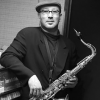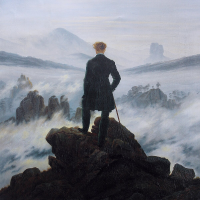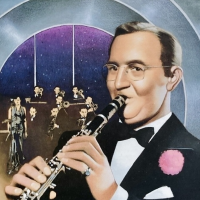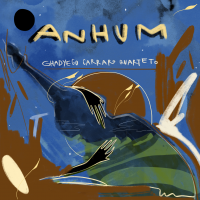Home » Jazz Musicians » Sidney Bechet
Sidney Bechet
Along with his fellow New Orleanian, Louis Armstrong, Bechet was one of the first great soloists in jazz. His throaty, powerful clarinet and his throbbing soprano are among the most thrilling sounds in early jazz. He went from being a pioneer of jazz in the 1920s to a national hero in France, where he spent the final decade of his life. In his teens he made his name playing in some of New Orleans's up-and- coming bands, and he played there and in Chicago with King Oliver.
Sidney Bechet was born in New Orleans in May 1897, of Creole ancestry, grew up in a middle class environment. His father, Omar, who was a shoemaker, played the flute as a hobby. Indeed, music had an important role in the Bechet household, as Sidney's four brothers also played instruments. His brother, Leonard, played the clarinet and trombone, and it was to the former instrument that eight- year-old Sidney was attracted. Leonard, whose main interest was the trombone, passed along his clarinet to his younger brother. At first, Sidney played in the family musicales - waltzes, quadrilles, and the polite music of the middle class. But as he grew into adolescence, Sidney was attracted to the syncopated music played in the dance halls and brothels in the Storyville District. As a boy, he would watch the street parades in which jazz bands played and was so attracted to the music, that he often played hooky from school. As he became more proficient on the clarinet, Sidney played in local jazz bands, such as the Young Olympians. His playing so impressed Bunk Johnson, the legendary cornet player, that Sidney was invited to join Johnson's band, the Eagle Band. Sidney gained much experience, playing in dance halls, and for picnics, and parties.
Bechet left New Orleans for the first time when he was 19, traveling to Chicago with pianist, Clarence Williams and his variety show. He recorded a few sides there with Williams in 1923 for the Okeh label, released under the name of Rosetta Crawford accompanied by King Bechet Trio. Bechet plays some very soulful clarinet and saxophone on these sides. He then joined up with King Oliver. Bechet's big break came in 1919 when the composer-conductor Will Marion Cook asked him to join his Southern Syncopated Orchestra for an engagement in London where he came to the attention of the noted Swiss Conductor, Ernst Ansermet, who conducted the music of Stravinsky for the Ballets Russa. Ansermet wrote in a Swiss musical Journal, "The extraordinary clarinet virtuoso Bechet is an artist of genius!"
Read moreTags
Jazz À La Creole: French Creole Music and the Birth of Jazz

by Richard J Salvucci
Jazz À La Creole: French Creole Music and the Birth of Jazz Caroline Vézina 236 Pages ISBN: #9781496842428 University Press of Mississippi 2022 The term “creole" is one of those protean things whose meaning hinges on the context in which it is used. At the very least, it tends to suggest some degree of acculturation or multiple ethnic influence, sometimes biologically, sometimes not. Whatever the case, it is a problematic word and ...
Continue ReadingDixieland Revival – A Sense of History (1939 - 1955)

by Russell Perry
In the 1940's, some twenty-five to thirty years into the history of recorded jazz, the sometimes violent reaction against the bebop revolution caused a hard look into the rear view and the jazz world focused on its own history. Many of the players who led the first jazz revolution were still alive, ready for prime time, and welcoming of another chance at center stage. The outside forces that led the small ensembles of bebop and R&B into prominence, also supported ...
Continue ReadingRunnin' Wild

by Mark Barnett
Getting Started If you're new to jazz, go to our Getting Into Jazz primer for some hints on how to listen. CD Capsule Two hot jazz legends melt the thermometer, pushing each other to produce the most inspired work of their careers. As the sportscasters say, “They came to play." Background “So these two alpha-male jazz musicians walk into a bar..." No, in this case they walked into a studio and made some outstanding (and oddly ...
Continue ReadingDo You Know What It Means to Miss New Orleans?

by Nathan Holaway
This article was originally published in September 2005. Do you know what it means to miss New Orleans? The Big Easy. The Crescent City. N'awlins. Some adore it, some despise it. In the aftermath of Hurricane Katrina, New Orleans continues to be the testimonial travesty of the United States. With certain political officials claiming that New Orleans is “not worth rebuilding, I would have to strongly object. Anyone who has ever enjoyed a beignet with chicory ...
Continue ReadingOn Highway 61: Music, Race, and the Evolution of Cultural Freedom

by Dennis McNally
The following is an excerpt from the “Spirituals to Swing" chapter of On Highway 61: Music, Race, and the Evolution of Cultural Freedom by Dennis McNally (Counterpoint Press, Berkeley, 2014). Danny Barker, who in the 1930s was Cab Calloway's guitarist, told a particularly revealing story of working at the Nest Club, a Harlem after-hours joint. Business would be dead when the doorman buzzed three loud rings to indicate that they had prospects coming. The band would strike ...
Continue ReadingSidney Bechet & Mezz Mezzrow: The King Jazz Records Story

by Chris Mosey
Three decades before Norman Mailer in 1957 drew attention to the social phenomenon of the “white negro," Mezz Mezzrow claimed to be just that. To use his own terminology, he was “a voluntary negro." Actually an American Jew, he played clarinet in the 1930s and 40s, often, as here, alongside Sidney Bechet. He supplemented his meager earnings as a musician by supplying marijuana to fellow jazzmen, including--famously--Louis Armstrong. He sold so much that for a while a ...
Continue ReadingSidney Bechet: Sidney Bechet

by Andrew Velez
Sidney Bechet (1897-1959) is a legendary jazz figure whose range of instruments included soprano, tenor and bass saxophones, piano, bass, drums and, most famously, the clarinet. A true jazz star, Bechet's graceful playing and structural skill made him into the first significant jazz soloist, even before his fellow New Orleans native, Louis Armstrong. This collection is a mix of sides from sessions made for King Jazz in New York (1945) and Chicago (1947) with varying blues-oriented bands. ...
Continue ReadingBackgrounder: Sidney Bechet/Martial Solal

Source:
JazzWax by Marc Myers
Soprano saxophonist Sidney Bechet was one of jazz's most complex giants. Born in New Orleans in 1897, four years earlier than Louis Armstrong, Bechet made his first recordings in early 1920, three years before the trumpeter. Unfortunately, these recordings were never issued. His first released recordings, for Okeh, came out the same year as Armstrong's earliest 78s, in 1923. The following year Bechet was with Duke Ellington, and his clarinet-like approach on the soprano sax influenced Ellington's vision for his ...
read more
Jazz Musician of the Day: Sidney Bechet

Source:
Michael Ricci
All About Jazz is celebrating Sidney Bechet's birthday today!
Along with his fellow New Orleanian, Louis Armstrong, Bechet was one of the first great soloists in jazz. His throaty, powerful clarinet and his throbbing soprano are among the most thrilling sounds in early jazz. He went from being a pioneer of jazz in the 1920s to a national hero in France, where he spent the final decade of his life. In his teens he made his name playing in some ...
read more
Jazz Musician of the Day: Sidney Bechet

Source:
Michael Ricci
All About Jazz is celebrating Sidney Bechet's birthday today!
Along with his fellow New Orleanian, Louis Armstrong, Bechet was one of the first great soloists in jazz. His throaty, powerful clarinet and his throbbing soprano are among the most thrilling sounds in early jazz. He went from being a pioneer of jazz in the 1920s to a national hero in France, where he spent the final decade of his life. In his teens he made his name playing in some ...
read more
Jazz Musician of the Day: Sidney Bechet

Source:
Michael Ricci
All About Jazz is celebrating Sidney Bechet's birthday today!
Along with his fellow New Orleanian, Louis Armstrong, Bechet was one of the first great soloists in jazz. His throaty, powerful clarinet and his throbbing soprano are among the most thrilling sounds in early jazz. He went from being a pioneer of jazz in the 1920s to a national hero in France, where he spent the final decade of his life. In his teens he made his name playing in some ...
read more
Jazz Musician of the Day: Sidney Bechet

Source:
Michael Ricci
All About Jazz is celebrating Sidney Bechet's birthday today!
Along with his fellow New Orleanian, Louis Armstrong, Bechet was one of the first great soloists in jazz. His throaty, powerful clarinet and his throbbing soprano are among the most thrilling sounds in early jazz. He went from being a pioneer of jazz in the 1920s to a national hero in France, where he spent the final decade of his life. In his teens he made his name playing in some ...
read more
Jazz Musician of the Day: Sidney Bechet

Source:
Michael Ricci
All About Jazz is celebrating Sidney Bechet's birthday today!
Along with his fellow New Orleanian, Louis Armstrong, Bechet was one of the first great soloists in jazz. His throaty, powerful clarinet and his throbbing soprano are among the most thrilling sounds in early jazz. He went from being a pioneer of jazz in the 1920s to a national hero in France, where he spent the final decade of his life. In his teens he made his name playing in some ...
read more
Jazz Musician of the Day: Sidney Bechet

Source:
Michael Ricci
All About Jazz is celebrating Sidney Bechet's birthday today!
Along with his fellow New Orleanian, Louis Armstrong, Bechet was one of the first great soloists in jazz. His throaty, powerful clarinet and his throbbing soprano are among the most thrilling sounds in early jazz. He went from being a pioneer of jazz in the 1920s to a national hero in France, where he spent the final decade of his life. In his teens he made his name playing in some ...
read more
Jazz Musician of the Day: Sidney Bechet

Source:
Michael Ricci
All About Jazz is celebrating Sidney Bechet's birthday today!
Along with his fellow New Orleanian, Louis Armstrong, Bechet was one of the first great soloists in jazz. His throaty, powerful clarinet and his throbbing soprano are among the most thrilling sounds in early jazz. He went from being a pioneer of jazz in the 1920s to a national hero in France, where he spent the final decade of his life. In his teens he made his name playing in some ...
read more
Jazz Musician of the Day: Sidney Bechet

Source:
Michael Ricci
All About Jazz is celebrating Sidney Bechet's birthday today!
Along with his fellow New Orleanian, Louis Armstrong, Bechet was one of the first great soloists in jazz. His throaty, powerful clarinet and his throbbing soprano are among the most thrilling sounds in early jazz. He went from being a pioneer of jazz in the 1920s to a national hero in France, where he spent the final decade of his life. In his teens he made his name playing in some ...
read more
Jazz Musician of the Day: Sidney Bechet

Source:
Michael Ricci
All About Jazz is celebrating Sidney Bechet's birthday today! Along with his fellow New Orleanian, Louis Armstrong, Bechet was one of the first great soloists in jazz. His throaty, powerful clarinet and his throbbing soprano are among the most thrilling sounds in early jazz. He went from being a pioneer of jazz in the 1920s to a national hero in France, where he spent the final decade of his life. In his teens he made his name playing in some ...
read more
























































